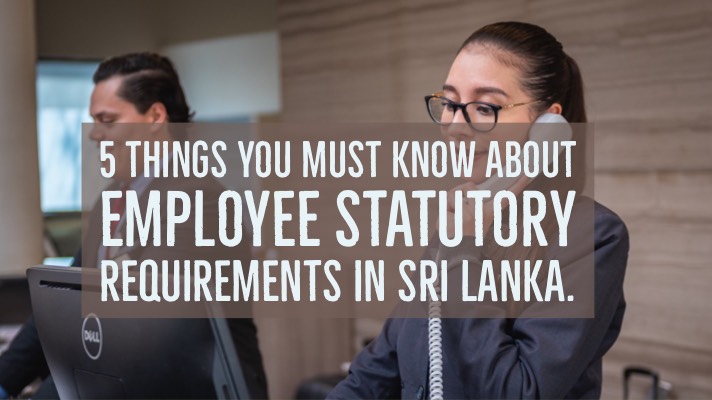Sri Lanka is a nation with a mixed economy where both private sector and government sectors employee Sri Lankans and foreigners. Sri Lanka welcomes foreign investments, and to support this several free trade zones, regulations and easy access schemes have been established. The economy is based on agriculture, apparel, and services such as BPO, KPO whereas many investors look at expanding to Sri Lanka due to its strategic location.
When doing business in Sri Lanka, it is important to understand and be aware of the employee statutory requirements. Listed down below are a few important things to know according to experts at ExroAsia.
Entitlements when working in Sri Lanka
Minimum wage: Monthly minimum wage for all employees irrespective of the industry is LKR 10,000 whereas the minimum daily wage is LKR 400.
Working hours: Daily working hours including meals and rest should not increase 9 hours per day and 45 hours per week.
Pay cycle: Wages can be paid daily, weekly, biweekly, or monthly on a working day, wage period should not exceed a month.
Overtime: Overtime should be paid 1.5 times higher than the average hourly rate not exceeding 12 hours per week.
Leave
Saturdays and Sundays are considered public holidays including a holiday for the full moon day monthly, therefore Sri Lanka gets 125 holidays per year. All public holidays, Saturdays, and Sundays are considered Bank Holidays.
Public holidays: An employee who works a minimum of 28 hours per week is entitled to one and half days paid holiday in that week or the week after.
Annual leave: An employee is entitled to 14 days of annual leave for each completed year of service.
Casual leave: An employee is entitled to 7 days of casual leave for each year except the first year of employment, during the first year the employee gets one day of paid leave every two months.
Maternity leave: A female employee is entitled to 84 days of paid leave and cannot be dismissed based on pregnancy or any other illness related to pregnancy.
Sick leave: Every employee is entitled to a total 7 days of sick leave within a year.
Paternity leave: Paternity leave is limited to 3 days for government sector, where the employee must take this within 3 months of the birth of the child.
Taxes in Sri Lanka
Tax year: The tax year is from 1st April to 31st March of the subsequent year. Companies need to pay in quarterly installments in advance. Companies can also apply for different accounting period.
Personal Income Tax:
Residents: The income tax rate for a resident is between 4% and 24%, depending on the level of profits and income earned each year of assessment.
Employees: The employer is required to deduct tax under a withholding scheme, termed as ‘PAYE’ (Pay As You Earn) tax.
Corporations: The corporate income tax is 28% (Tax rates of 14% and 40% apply to profits from specific businesses)
Employee Statutory Benefits
Insurance: Employees are generally given an insurance cover by employer.
Bonus: Paying a bonus is entirely at the discretion of the employer.
Retirement: An employee can retire at the age of 55.
Pension: It is payable to men from 55 and women from the age of 50.
Employee Provident Fund: The employer and employees contribute to the Employees’ Provident Fund (EPF) and Employees’ Trust Fund (ETF). The minimum contribution should be 8% by employees and 12% by employers in EPF, and 3% by employers in ETF.
Termination
Notice Period: 1 month
Probation Period: The probation period will not exceed one year in the case of employees in supervisory or technical capacity and six months in any other employee. The employer may further extend in some cases for a maximum of 3 months.
